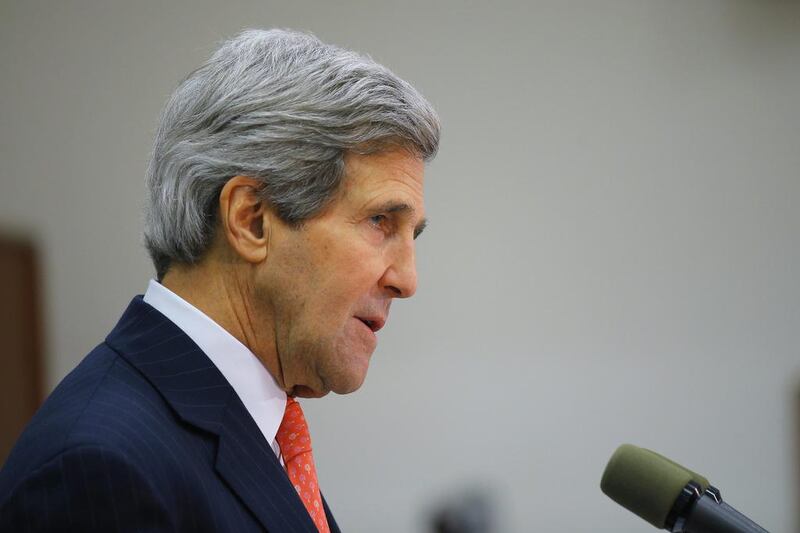JERUSALEM // The US secretary of state, John Kerry, sought on Friday to promote his security plans for a future Palestinian state, after president Mahmoud Abbas rejected an Israeli presence under any deal.
Mr Kerry was in Jerusalem for talks with the Israeli prime minister, Benjamin Netanyahu, who was accompanied by the defence minister, Moshe Yaalon.
Mr Kerry had to amend his plans to travel from Jerusalem to Jordan amid fierce snowfall and rain storms, opting instead to head later straight to his next stop, Vietnam.
“I wanted to come through here in an effort to try to continue our important discussions,” Mr Kerry said. “It’s been constructive. It’s always complicated. And I look forward to having some good talks this morning after meeting with president Abbas last night. We have a lot to talk about, and we will continue this process.”
After meeting Mr Kerry in Ramallah on Thursday, Mr Abbas rejected US proposals for Israel to keep troops in a future Palestinian state along its strategic border with Jordan.
“President Abbas has rejected the ideas presented by the secretary of state,” a Palestinian source said on Friday.
Mr Abbas also handed Kerry a letter laying down “Palestinian red lines”, the source said, singling out “the refusal to recognise Israel as a Jewish state”.
Mr Abbas “rejected the ideas on security because there is not a third party”.
This refers to a plan by former US national security adviser, James Jones, under which a third party would deploy along the Palestinian-Jordanian border.
The Palestinian source said that “all disputed issues must be settled”.
Concerned that a final status agreement may not be possible by the May target date the two sides accepted when they resumed talks in August, US officials have said Mr Kerry is hoping for a framework accord that would contain the principles of a comprehensive pact, but not specific details. If an outline were achieved, the negotiations could be extended beyond the nine-month timeline originally set by Mr Kerry.
The officials, who spoke to reporters aboard Kerry’s plane, stressed that an agreement on all issues – including security, borders of a future Palestinian state, the status of Jerusalem and the fate of Palestinian refugees – by May remains the goal.
But, should that prove unworkable, they said a framework agreement would buy time for additional negotiations. Mr Netanyahu and Mr Abbas agreed after numerous rounds of meetings with Mr Kerry to negotiate for a minimum of nine months.
A framework accord, the officials said, would be a “logical step” on the path to a final status agreement.
Mr Kerry, along with the special US Middle East peace envoy Martin Indyk, met separately and then together for about three hours on Monday with the chief Israeli negotiator, Tzipi Livni, and her Palestinian counterpart, Saeb Erekat. Ms Livni and Mr Erekat were in Washington for a conference in which the US president, Barack Obama, Mr Netanyahu and Mr Kerry participated.
On Monday, though, top Abbas aide Yasser Abed Rabbo said if Mr Kerry finalised a framework accord, he would be breaking a promise to try to negotiate a final agreement in the current round of talks.
The Palestinians are concerned that a framework deal will accommodate very specific Israeli security demands while offering only vague promises to the Palestinians, Mr Abed Rabbo said.
Security arrangements between Israel and a future Palestine would be central to such a framework. Mr Kerry has argued that progress in negotiations is only possible if Israeli security concerns are addressed first.
The security proposals presented to Mr Abbas and Mr Netanyahu include arrangements for the border between Jordan and a state of Palestine.
US officials have refused to discuss details, but Palestinian officials say they would give Israel final say at that border for at least 10 years and would also have a military presence in the strip of land next to it, the West Bank’s Jordan Valley.
Israeli officials have said they fear militants and weapons could be smuggled into a future Palestine if Israel gives up control over the West Bank-Jordan border. Mr Abbas has said he is willing to accept an international presence there, but not Israeli forces.
The Palestinians want a state in the West Bank, Gaza and east Jerusalem, lands Israel captured in 1967, but are willing to accept minor land swaps in drawing the final border to accommodate some of the settlements Israel has built on war-won land.
* Agence France-Presse with additional reporting by Associated Press





